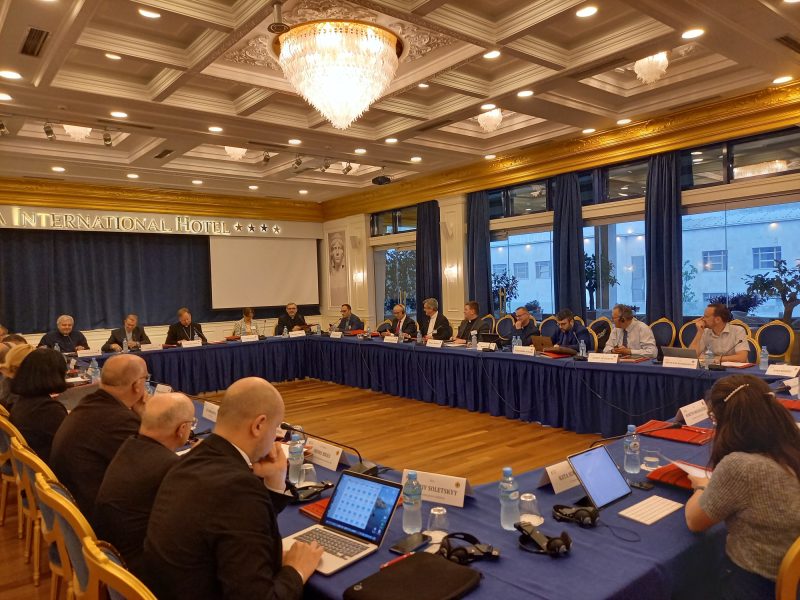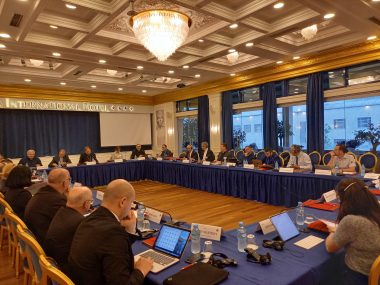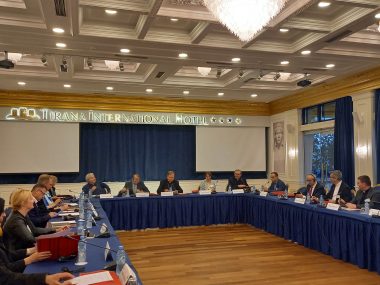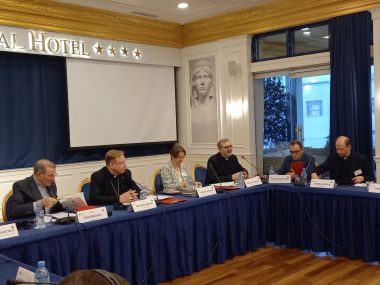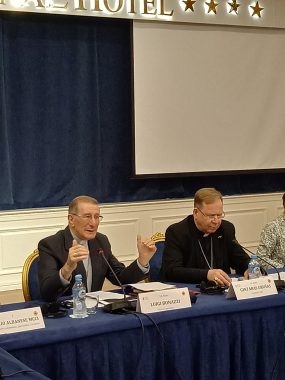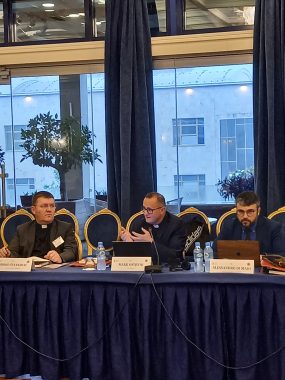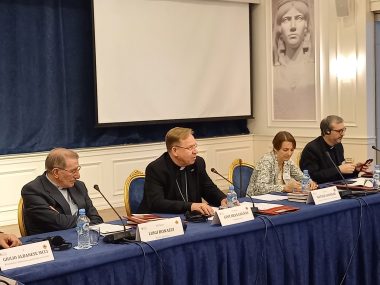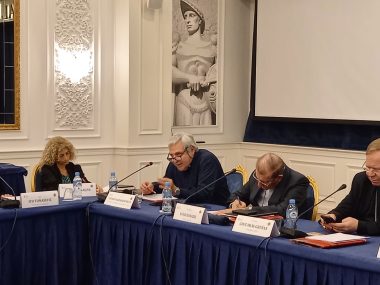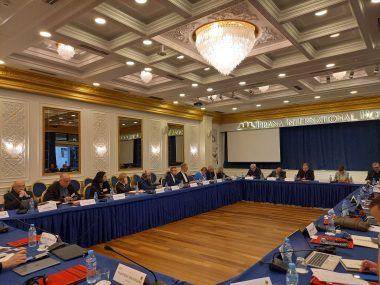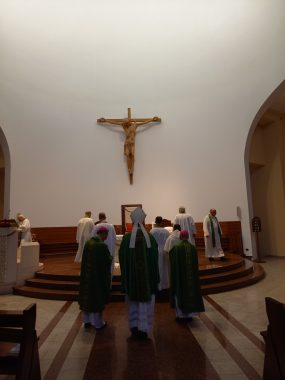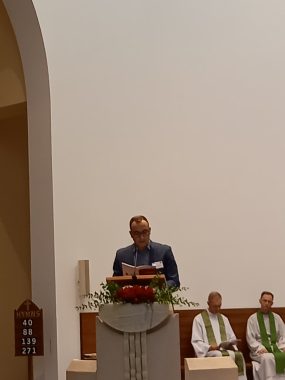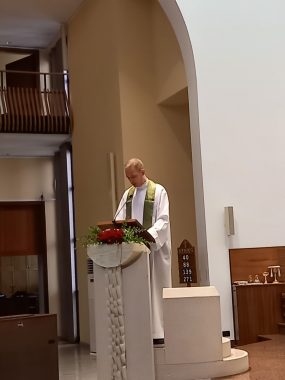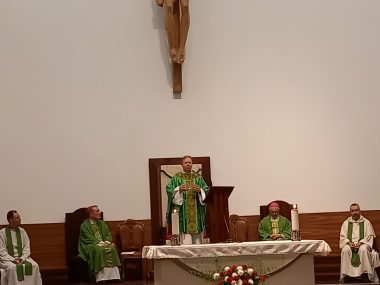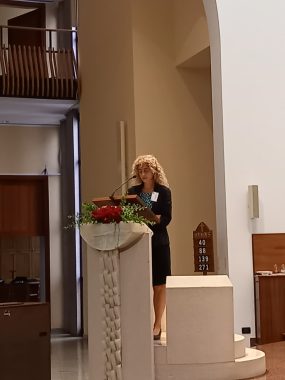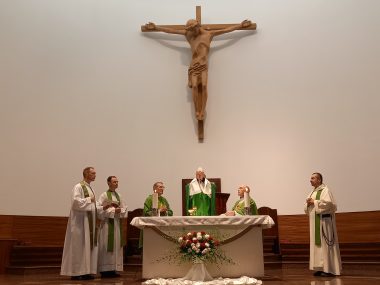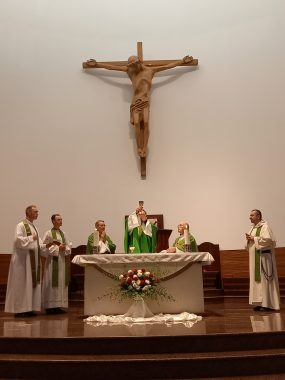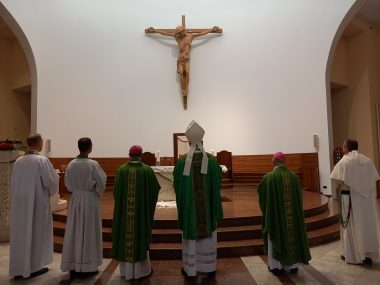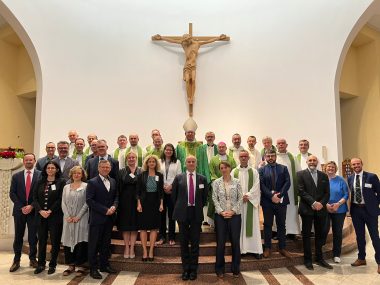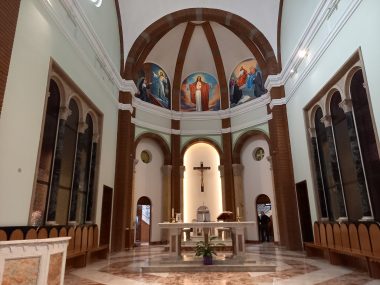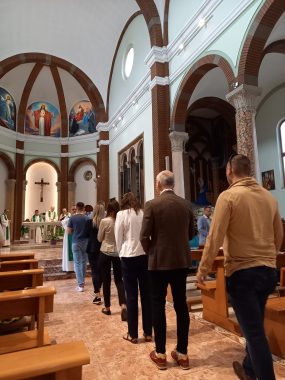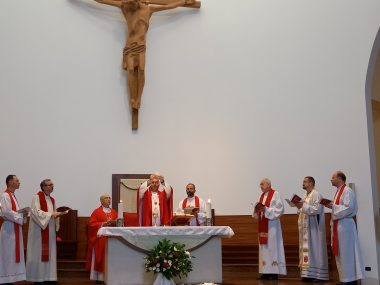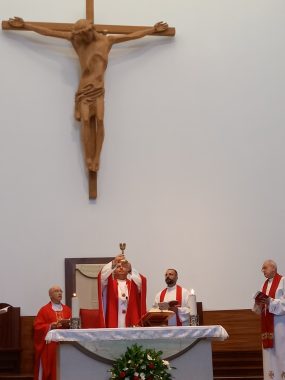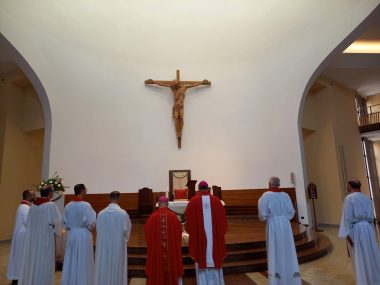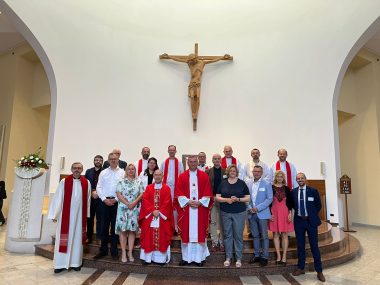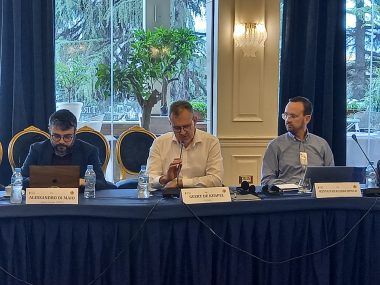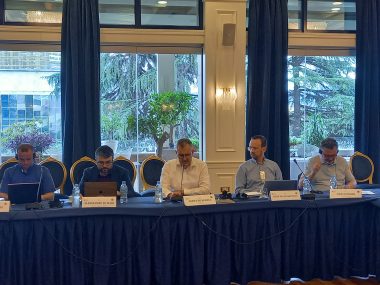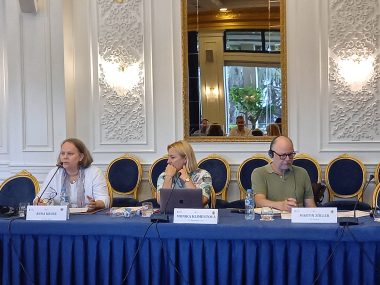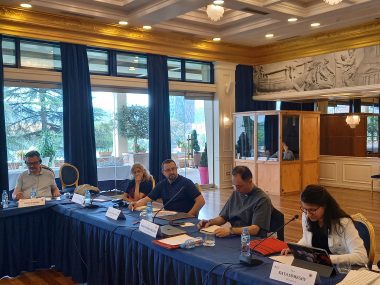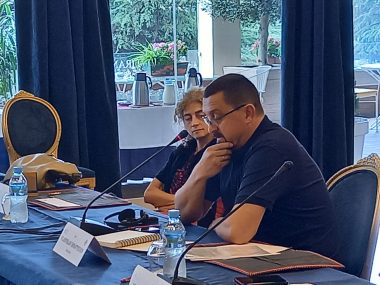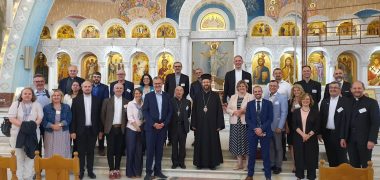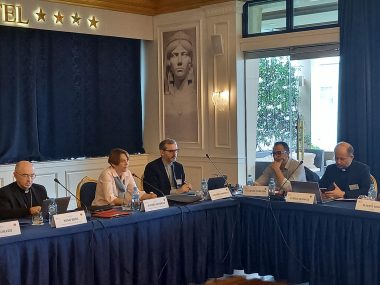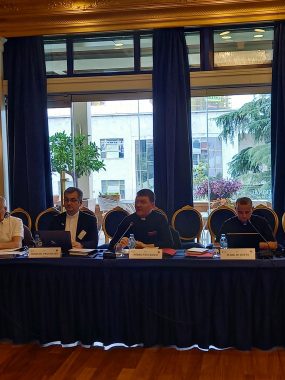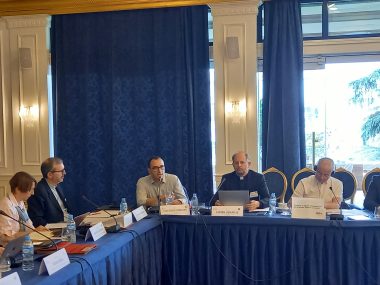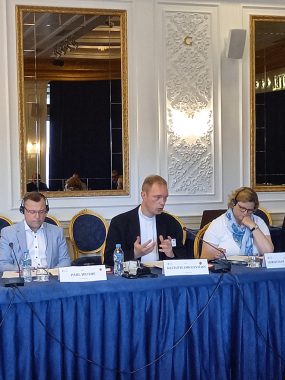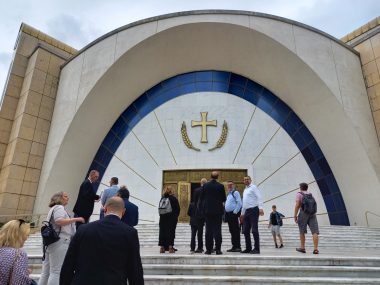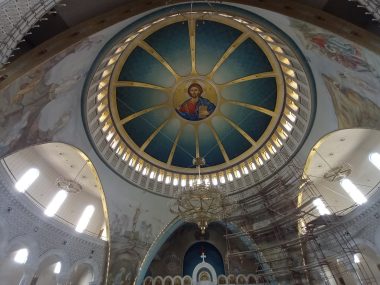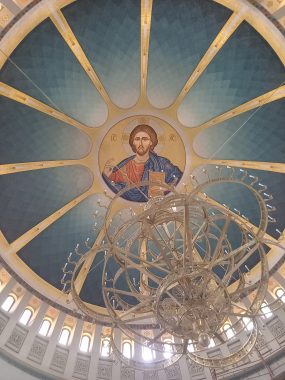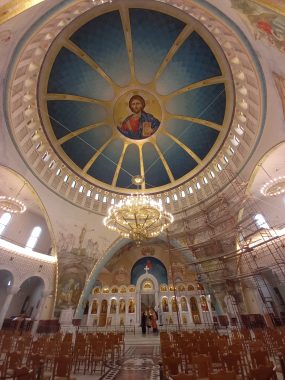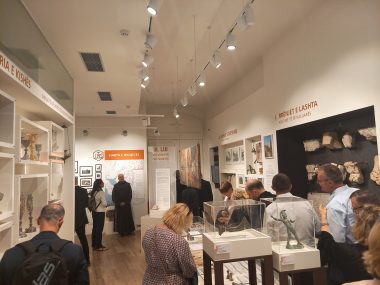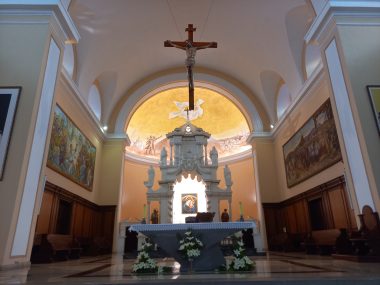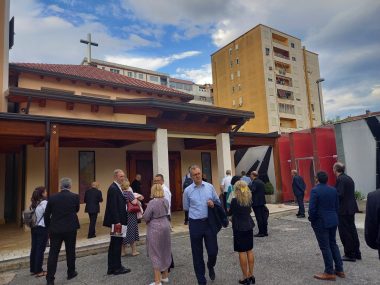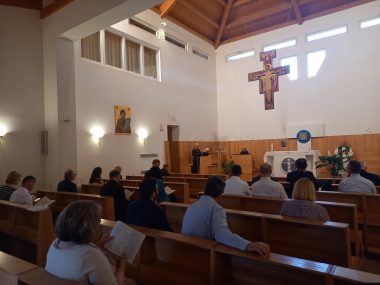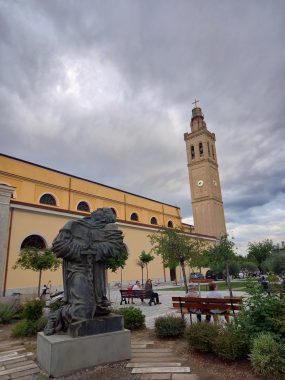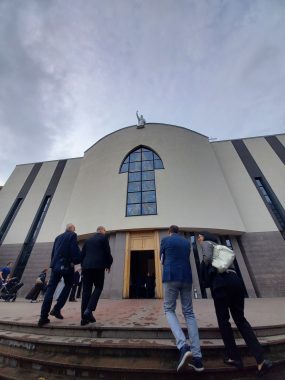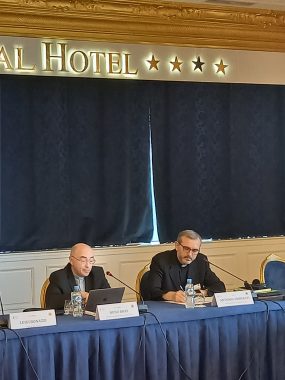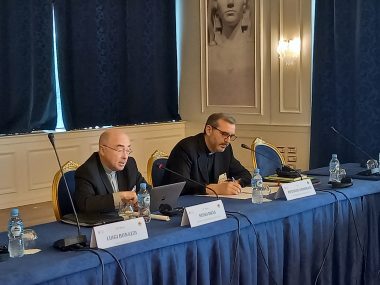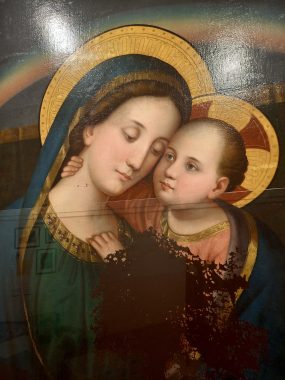The annual meeting of the Press Officers and Spokespersons of the European Bishops’ Conferences was held in Tirana from 9 to 11 June. At the heart of the proceedings was “the commitment to peace and the synodal path”: together reflecting on the challenges facing the Church due to the conflict in Ukraine and in the light of the Synodal path initiated by Pope Francis.
Welcoming the 35 communication officers of the European Churches who had come to the Albanian capital for this first meeting since the start of the pandemic was H.E. Msgr. Luigi Bonazzi, Apostolic Nuncio to Albania, who in his speech presented the recent history and current situation of the Albanian Catholic Church.
H.E. Msgr. Gintaras Grušas, Archbishop of Vilnius and CCEE President, while introducing the work, spoke of the very delicate moment we are living in Europe: “First, the pandemic due to Covid-19 that has affected everyone’s life these past two years and continues to have negative effects not only economically and socially, but also on our daily relationships and activities. Then, just when Covid was loosening its grip and every country was looking optimistically to the future, war broke out in Ukraine”. And, condemning Russian aggression once again, he expressed the closeness of the European bishops and Christian communities to the Ukrainian people and renewed the appeal of the entire Church to the leaders of nations to work to silence the weapons.
On the subject of the Synod on Synodality, President Grušas spoke of the many expectations within, as well as outside, the Church and the important role entrusted to communication: “it is up to you, first of all, to publicise what is happening at this stage and, at the end of the Synod, to present the results of this ecclesial consultation as best as possible”. Emphasising that this meeting is the first of three opportunities for sharing, in July the meeting of the General Secretaries and in October that of the Presidents, he described the contributions and interventions as valuable “of these days that allow us to get information from the individual Bishops’ Conferences and also a fruitful exchange in view of the continental Synodal Assembly”. Finally, he announced the appointment in Prague, from 5 to 12 February 2023, for the continental phase of the Synod on which the CCEE is already working.
Attempting to better understand the current situation and reflect on the challenges Europe will face after the war in Ukraine, Father Giulio Albanese, a Combonian missionary, journalist and writer, offered “a thematic analysis of the major global issues in this first segment of the Third Millennium, in the light of what is happening in Eastern Europe and beyond. Furthermore, we will attempt to identify paths of redemption for our church communities, with the declared intention of acting for the cause of the Kingdom of God, giving a voice to the voiceless”.
Faced with the current international geopolitical situation, the churches in Europe cannot remain indifferent: “radical reform is required to counter inequalities and all forms of imperialism”. Some suggestions:
- “first of all, a qualitative leap is needed, moving from welfarism (not necessarily well-deserving) to the affirmation of a commitment capable of achieving the true progress of peoples”;
- “Today, as never before, treasuring the enlightened magisterium of Pope Bergoglio, it is necessary to speak of ‘universal brotherhood’, promoting it and thus countering the weak thinking of the proponents of nationalisms or sovereignisms, in the Christian certainty that humanity has a common destiny. A mission that is not only decentralised to the periphery, but which demands truly courageous choices, under the banner of collegiality”;
- “as many will recall, Pope Francis, in his Apostolic Exhortation Evangelii Gaudium, states that ‘politics, so much denigrated, is a very high vocation, it is one of the most precious forms of charity, because it seeks the common good’”;
- “there is a need to define strategies that allow the social magisterium of the church to fully enter the ordinary pastoral care of local churches; it matters little whether in Asia, Africa, Europe, Oceania or the Americas. The feeling is that there is a short-circuit between what is preached in church, taught to the catechumens, told to the laity, and the so-called social doctrine centred on solidarity, subsidiarity, the common good and the value of human life”.
Prof. Nataša Govekar, Director of the Theological-Pastoral Department of the Vatican Dicastery for Communication, introduced the second theme of the meeting – that of the Synod: “Towards the XVI General Assembly: walking with the people of God”.
‘Communication’ and ‘Europe’ were the two terms underlying her reflection on the path of Christians in Europe. True communication cannot be divorced from testimony, said Govekar, and quoting Pope Francis at the awarding of the Charlemagne Prize, she added: “Only a Church rich in witnesses can restore the pure water of the Gospel to the roots of Europe”.
The call to synodality lies in rediscovering the other as a person and in the sense of belonging to a community: “person and community are therefore the foundations of the Europe that, as Christians, we want and can help to build”.
The exercise of listening is necessary, which is the first sign of fraternal charity. Listening has the power to reawaken trust between people. “In order to be an ‘outgoing Church’ we all need to accept this challenge of listening, we need each one of us Christians to agree to go out of ourselves, to be outstretched towards the other with the ear of the heart”.
And she concluded: “The purpose of the synod on synodality is to learn to walk together. … Starting to walk requires a certain amount of effort and may not be pleasant, at least not immediately. But it is the condition for living as a healthy Church, an outgoing Church, a listening Church, a synodal Church”.
Her report opened the phase of sharing national experiences with the interventions of the participants who presented the work on the Synod being done in their respective Bishops’ Conferences.
The picture that emerged is broad and enriching. The synodal meeting places were many: churches, oratories, schools, cultural centres, squares, gyms, private homes. Different methodologies were also used for the meetings: questionnaires, small groups, larger assemblies, family groups. Among the topics that emerged from the synodal meetings: the role of women in the Church; the participation of the laity in the life of the Church; the management of decision-making power; inclusion of ‘marginal’ groups.
The conclusions were entrusted to H.E. Msgr. Nuno Bràs, Bishop of Funchal and head of the CCEE’s Social Communication Section: “In these days, the need to be representative of God’s presence has emerged strongly among us: we cannot just complain, we must bear witness. War creates in everyone the question, ‘where is God?’ And we as Christians cannot but be His presence, His witness, we cannot but be hope, and bring our solidarity to the tormented people of Ukraine”.
And again, the Church has a duty to reconcile this emergency of war with the Synodal path: “Synodality is above all listening to the other, and not only with the ear but with the heart, open and available to the other and to what he or she is experiencing; dramas, expectations and hopes. We can truly say that war awakens us to synodality, to an effective synodality, made up of words, but above all, of our attitude towards those around us”.
During the days of the conference, there were also many moments of meeting and exchange with the Albanian bishops: that with H. E. Msgr. Angelo Massafra, Archbishop of Shkodër-Pult and President of the Albanian Bishops’ Conference, who guided participants on a tour of the museum and cathedral in Shkodër; the celebrations of the Eucharist with H.E. Msgr. Gjergj Meta, Bishop of Rrëshen and General Secretary of the Albanian Bishops’ Conference and with H.E. Msgr. Arjan Dodaj, Metropolitan Archbishop of Tirana-Durazzo.
Attached are the texts of the speakers.

